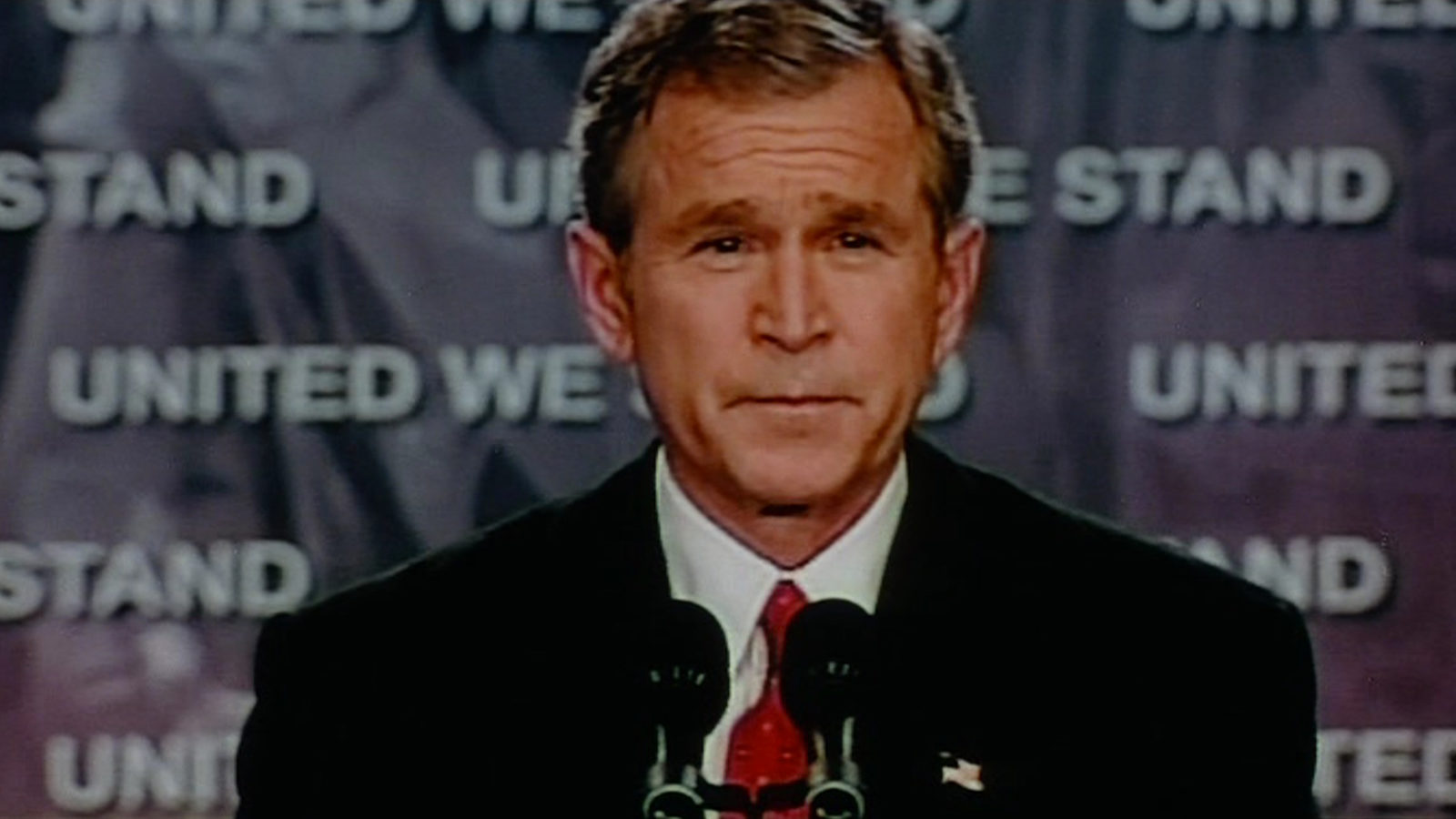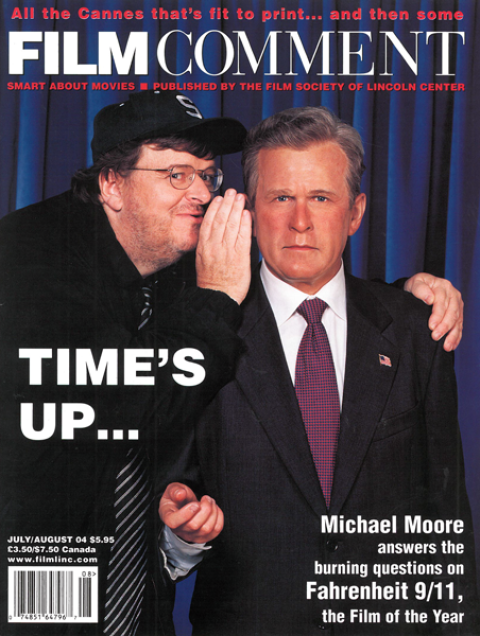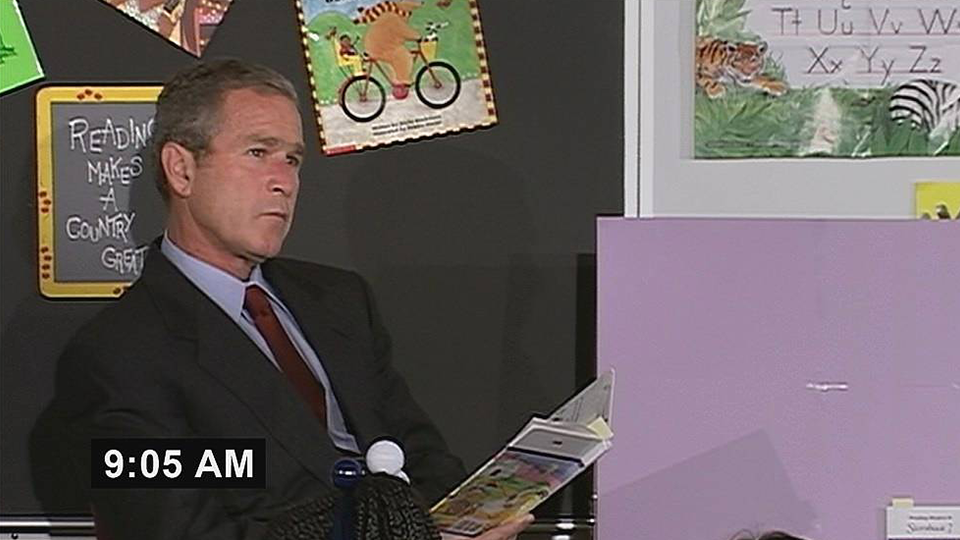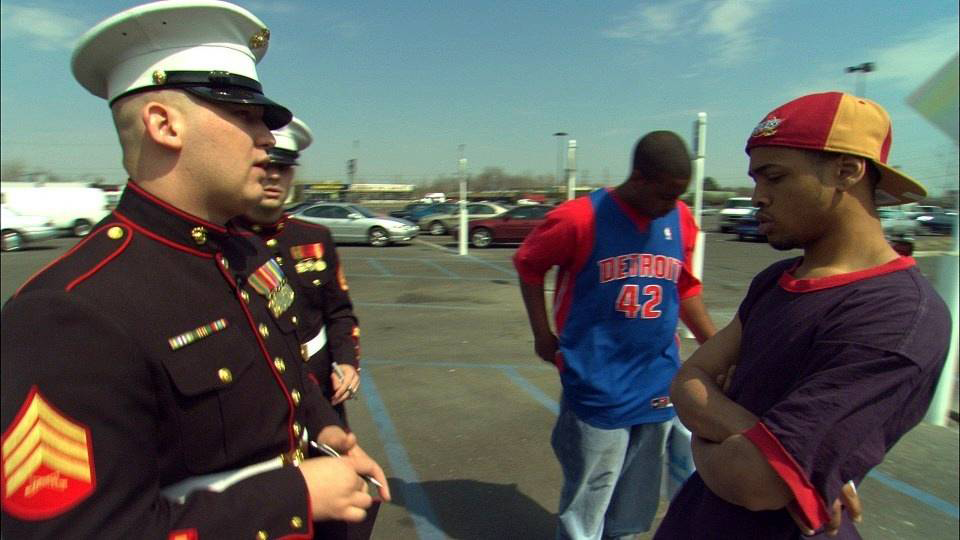By Kent Jones in the July-August 2004 Issue

This Means War! Fahreinheit 9/11
Much more than a scathing indictment of Dubya-era complicity, Michael Moore's exposé lays bare the devastating heartbreak now central to America's wartime reality
June 9, 2004. I wake up, turn on the radio, and learn that not one but two memos have been leaked from the White House, two among many. Apparently based on directives from the office of the vice president, teams of lawyers were instructed over a year ago to work on definitions of torture, in order to stretch the limits of international law in our war on terror. I hear snippets of John Ashcroft explaining to a Senate committee that he decided not to provide it with copies of the memos because he was afraid of “compromising” executive privilege. Every day, a little more smoke comes pouring out of the gun.

From the July-August 2004 Issue
Also in this issue
Next story: the legacy of the late President Reagan, whose face may soon adorn Mount Rushmore and replace Alexander Hamilton’s on the $10 bill. He gave America back its self-confidence. He was single-handedly responsible for ending the cold war and defeating communism. He was a visionary. Mikhail Gorbachev and Dick Cheney are deeply saddened, but so are Bill Clinton and John Kerry, who is taking a few days off from his campaign. Supposedly, he’s afraid that all the encomiums in honor of the second most clueless man to ever become president will dwarf whatever media coverage Kerry manages to garner for the week. Or—and this is the more sobering alternative—perhaps he’s genuinely moved.
It’s like watching the smoke pour back into the gun, in agonizing slow motion. The nation that remembers Reagan as such a wonderful president, forgetting what he did to the unions or the Nicaraguans, forgetting his indifference to the plight of AIDS victims or the fact that he couldn’t utter two coherent words that hadn’t been scripted, or that he presided over the most corrupt administration since Harding’s, is not going to be bothered by such pesky inconveniences as torture memos, missing WMDs, or cozy relationships between the White House and the energy industry. Half of the Reagan administration may have resigned in disgrace, and Iran-Contra may have made Watergate look like a minor intramural fracas, but Reagan himself still stands tall, even in death. The lesson is: if the right person tells us that everything is okay, then everything must be okay. Why do Americans need endless reassurance about how nice and decent we are? Did it begin with Reagan?

Fahrenheit 9/11
The whole toxic mixture has come to a full boil with Bush II. “On September 12, 2001, the world was with us,” wrote Louis Menand in a recent New Yorker article. “Because of our government’s mad conviction that it was our way of life that was under attack, not the way of life of civilized human beings everywhere, we squandered our chance to be with the world. The observation is now so obvious as to be banal.” True enough. And it’s because of Reagan’s example, and the ridiculously high premium he put on the idea of America “feeling good about itself,” that the observation needs to be proven over and over again, no matter how obvious. “Facts are stupid things,” Reagan once remarked. This innocuous utterance was his greatest gift to the Republican Party. It has allowed it to run rampant with the hearts and minds of countless disenfranchised Americans.
It’s a commonly held truth that the opposition has all but imploded in the face of Republican unity. There is no sense of common cause among the splintered agendas that now make up the American left. Despite Chomsky’s assertion that real change is occuring a little bit at a time at a grassroots level, the lack of one unified concept or general idea, one banner under which we can unite, is painfully felt. Despite all the talk of both parties being part of the same corrupt machinery, the Democrats once stood for some form of opposition. Which they stopped doing the minute they decided it was in their best interests to be so nice and deferential to Reagan. The right has stayed so consistently “on-message” that they’ve been able to sell their ideas in bite-size nuggets and on all fronts, through everyone from Bill “Let It Ride” Bennett to Jerry Falwell to the current governor of California. Meanwhile, every time one of those sculpted-haircut types like Gephardt emerges to speak in tones of feigned earnestness about “fairness” and “balance,” your heart sinks.

Fahrenheit 9/11
Enter Michael Moore, at the tail end of the Reagan era, with Roger & Me. Who took it upon himself to beat the cons, neo-and otherwise, at their own game by turning himself into a one-man band—a movement, a media-friendly comic icon, and a left-wing attack dog all in one. Some—many—were heartened by the simple fact of Moore’s existence. The fact that there was even one person out there in Mediaworld trying to counteract the torrent of right-wing invectives spewing from the airwaves and onto the printed page day in and day out was cause for celebration. I myself was never convinced. I was always turned off by Moore’s strategy of spoofing almost everyone with whom he came in contact, including the people he was supposedly ennobling. It’s a Letterman tactic, and to my mind it only counteracts Moore’s claims of compassion and solidarity with the down-and-out. In fact, it’s what put me off of Roger & Me. I grew up in a town that suffered a fate exactly like that of Flint, at the hands of GE, and I found Moore’s polemic far too eager to please, too loose with its facts. Moore seemed a little too eager to pat himself on the back for simply sticking his microphone into the faces of powerful people, and shooting down such easy targets as Bob Eubanks or Miss Michigan. Bowling for Columbine seemed even less impressive, a movie without much of a subject beyond the fact that we sure do have a lot of guns in America. Despite the power of the scenes in Flint and the brilliant tactical strike at Kmart (like a good episode of The Awful Truth), it struck me that Moore was playing a losing game. No matter how loud he shouted, the chorus of right-wing voices could always shout louder. In a misplaced effort to stir up his audience, Moore has made some questionable and even shameful moves, from the cheap jokes in Roger & Me to the ridiculous montage of covert American foreign adventures climaxing with the chickens-come-home-to-roost image of the plane slamming into the south tower, the cheap use of Columbine surveillance footage, and, above all, the unconscionable ambush of Charlton Heston in Bowling for Columbine. Moore was rabble-rousing with Columbine, but the only hearts and minds he won were the same ones he’d won in 1989, and continued to win, over and over again, with the assortment of movies, books, and TV shows in between.
That was then, and this is now. The world has taken many turns for the worse in the two years since Bowling for Columbine, and Moore, like many of us, is outraged. So outraged, it seems, that he’s rethought his own tried-and-true strategies. The fact that the genuinely incendiary Fahrenheit 9/11 will start aging on November 3, 2004, makes it no less potent. Moore has made some remarkably shrewd choices here. There’s a real subject this time, and surprisingly, it isn’t the connection between the Bush and bin Laden clans, which was the film’s starting point. That’s merely a prelude—an unusually forceful and well-researched prelude—to a devastating lament for the young men and women recruited from the poorest parts of America to go into harm’s way for an as yet unjustified cause. Moore mounts the evidence for Iraq as a political smoke screen to cover the Bush family’s insidious complicity with the Saudis with more care than he’s ever shown in the past—there’s a shocking moment when he and a camera crew show up outside the Saudi embassy and are confronted within minutes not by security guards but the Secret Service. There are many equally bracing moments in Fahrenheit 9/11: a parade of congresswomen, most of them African-American, rising to contest the final outcome of the 2000 elections, only to be shot down, one by one (by Vice President Gore!), because they lack a single Senate signature to give them the procedural go-ahead; a stunning representation of 9/11, as chillingly exact as that Columbine montage was lazily overgeneralized; some startling Iraqi footage, pre—Abu Ghraib, shot by embedded journalists and dissenting American soldiers, including a breath-catching moment where a soldier fiddles with the erection of an Iraqi prisoner hidden under a sheet. But to my mind, the most powerful moments in F 9/11 are devoted to kids from Flint and thereabouts, who are fodder for the war machine. As two peppy marines in full dress stride through the parking lot of a Michigan mall and zero in on potential recruits (“It’s always better to get them in twos,” says one), the sense of anger articulated by this film builds to a fever pitch.

Fahrenheit 9/11
And then comes Moore’s political masterstroke. As many have already noted, Moore all but absents himself from this film, making only a couple of relatively brief on-camera appearances (he narrates throughout, as usual). It’s a smart move. Because the average Joe may not be able to hear about the inanity of the Iraqi invasion from Moore himself, or from Chomsky, Krugman, or Vidal, but I have a feeling that he’ll hear it from Lila Lipscomb, a 49-year-old executive assistant from Flint, self-described “conservative Democrat,” sister of two vets who served proudly in Vietnam, and erstwhile hater of antiwar protesters. If you were in a clichéd, marketing-department frame of mind, you might call Lila Lipscomb a “typical midwesterner,” a “voice from the heartland.” And the loss of her son, Sgt. Michael Pedersen, a 26-year-old Black Hawk crew chief killed in action on April 4, 2003, has made her into a passionate and eloquent opponent of the Iraqi invasion. If anyone will bridge the culture war gap, it’s Lila. She’s a mother who simply wants her son back, and whose anger at all the bullshit about wmds and an Iraqi—Al Qaeda connection will never be assuaged. She’s onscreen for 20 minutes, and they’re the smartest and most moving 20 minutes Moore has ever committed to celluloid.
This is a far cry from the buffoonish self-aggrandizement of Columbine. There are no jokey cartoon alternate histories of America or overextended Canadian gags here. Even the funny stuff is brutally on- target: Bush sitting in a kids’ classroom on 9/11 and responding to the news by pretending to be absorbed in a copy of My Pet Goat; Paul Wolfowitz caught before the beginning of a broadcast feed doing something unspeakable with a comb; Moore and a disenchanted Iraqi vet cheerfully confronting congressmen on Capitol Hill and inviting them to consider enlisting their sons and daughters for service in Iraq; and the gift that just keeps on giving, John Ashcroft, singing his immortal composition, “Let the Eagle Soar.” Moore is so outraged at all the chicanery that’s been perpetrated in the name of 9/11 payback that he’s sharpened his mind and his rhetoric to a fine point. He ends his film with a quote from Orwell and an impassioned plea on behalf of the men and women we’ve sent to Iraq and Afghanistan that is concise, eloquent, and even stirring.
Fahrenheit 9/11 is not a film for the ages. It is a film for right here and right now, and it counts in a way that few films have ever counted. It won’t change the minds of the Safires or Limbaughs of this world, for whom facts are indeed stupid things. But if anything can cut through the thick haze of Reaganesque good cheer that’s been pumped into the country for the last quarter-century, it’s this movie.



